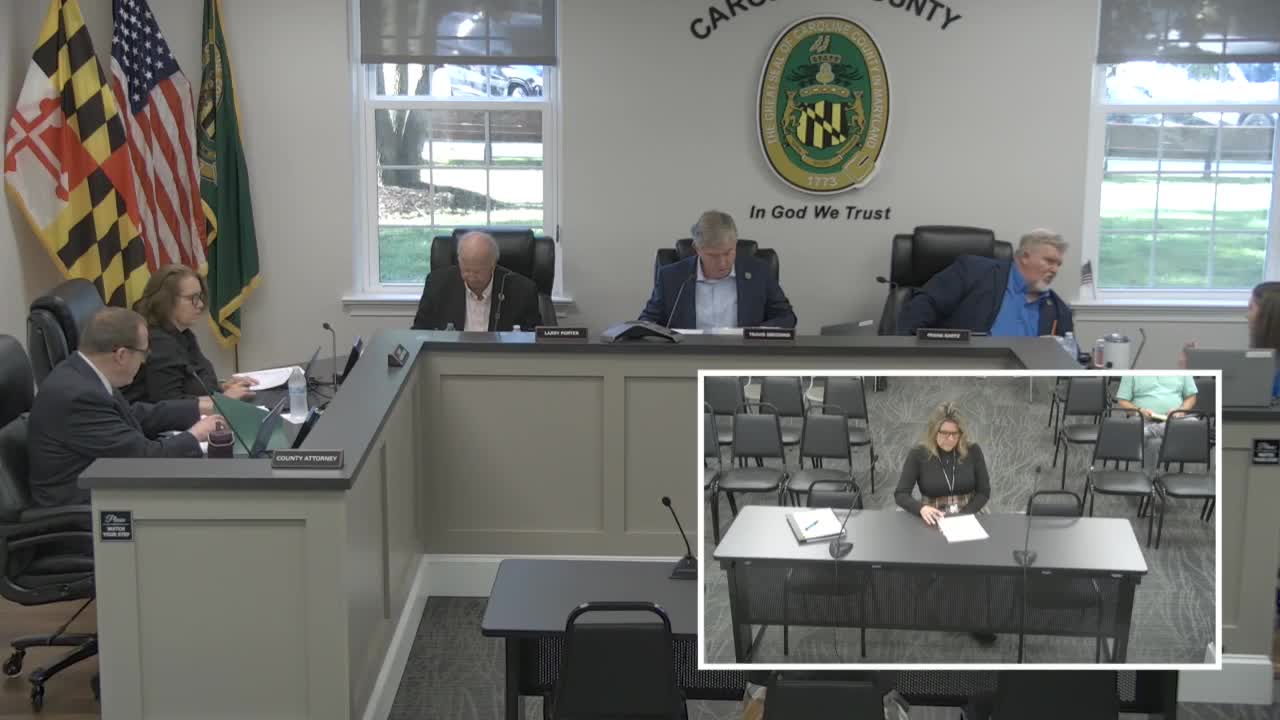Caroline County commissioners approve MOA to use Office of Administrative Hearings judges for police trial boards
October 07, 2025 | Caroline County, Maryland
This article was created by AI summarizing key points discussed. AI makes mistakes, so for full details and context, please refer to the video of the full meeting. Please report any errors so we can fix them. Report an error »

Caroline County commissioners voted on Oct. 7 to approve a memorandum of agreement (MOA) that allows the county and local law enforcement agencies to use administrative law judges supplied by the Maryland Office of Administrative Hearings (OAH) to preside over police trial boards.
The MOA, presented by Kim Raider, PABACC administrator, directs law-enforcement agencies (LEAs) to pay costs such as judge fees and court reporters; the county’s formal role is limited to appointing or declining any judge the OAH provides. "The first page of this MOA, the last paragraph, that is where your responsibility lies as commissioners, which is the public safety article requires the chief executive officer of the county to appoint an actively serving or retired administrative law judge," Raider said during the meeting.
Why it matters: the county lacks its own roster of administrative judges to staff a pending trial board after the passing of a judge referenced in the presentation. Commissioners and staff said the MOA mirrors arrangements in other counties and keeps the administrative and cost burdens for trial boards with the LEAs while giving the county a limited appointment role.
Key points from the presentation and discussion:
- Kim Raider said the MOA was developed with input from the county attorney’s office, the attorney general’s office, town managers and LEA attorneys. "We came up with the idea of putting this MOA together with all of the LEAs since we don't have a county police force."
- Costs for administrative judges, court reporters and other trial-board expenses will be paid by the law-enforcement agency whose officer is involved. Raider confirmed, "Yes. That is correct."
- Commissioners sought clarification of the county’s authority. County Attorney Stuart Barrow and Raider explained the statute requires the county executive to appoint (or decline) an administrative law judge when a trial board is convened.
- Commissioners pressed procedural questions about locations, virtual hearings and whether the OAH would provide lists. Raider said the OAH would provide a judge and the county could decline and request someone else.
The board approved a motion to "approve the member memorandum of agreement between the office of administrative hearings and Caroline County, Maryland, and provide approval to sign the MOA." The motion passed by voice vote; the meeting record shows the commissioners responded "Aye" and the chair announced, "Ayes have it."
What happens next: staff will provide the MOA to participating LEAs and execute the county's signature. The MOA assigns operational and expense responsibilities to LEAs; the county's obligation is limited to confirming or declining the administrative law judge offered by OAH.
The Oct. 7 vote took place during the regular meeting; the MOA was presented in the public portion of the agenda and carries no additional county-funded obligations beyond the appointment role described in the MOA.
The MOA, presented by Kim Raider, PABACC administrator, directs law-enforcement agencies (LEAs) to pay costs such as judge fees and court reporters; the county’s formal role is limited to appointing or declining any judge the OAH provides. "The first page of this MOA, the last paragraph, that is where your responsibility lies as commissioners, which is the public safety article requires the chief executive officer of the county to appoint an actively serving or retired administrative law judge," Raider said during the meeting.
Why it matters: the county lacks its own roster of administrative judges to staff a pending trial board after the passing of a judge referenced in the presentation. Commissioners and staff said the MOA mirrors arrangements in other counties and keeps the administrative and cost burdens for trial boards with the LEAs while giving the county a limited appointment role.
Key points from the presentation and discussion:
- Kim Raider said the MOA was developed with input from the county attorney’s office, the attorney general’s office, town managers and LEA attorneys. "We came up with the idea of putting this MOA together with all of the LEAs since we don't have a county police force."
- Costs for administrative judges, court reporters and other trial-board expenses will be paid by the law-enforcement agency whose officer is involved. Raider confirmed, "Yes. That is correct."
- Commissioners sought clarification of the county’s authority. County Attorney Stuart Barrow and Raider explained the statute requires the county executive to appoint (or decline) an administrative law judge when a trial board is convened.
- Commissioners pressed procedural questions about locations, virtual hearings and whether the OAH would provide lists. Raider said the OAH would provide a judge and the county could decline and request someone else.
The board approved a motion to "approve the member memorandum of agreement between the office of administrative hearings and Caroline County, Maryland, and provide approval to sign the MOA." The motion passed by voice vote; the meeting record shows the commissioners responded "Aye" and the chair announced, "Ayes have it."
What happens next: staff will provide the MOA to participating LEAs and execute the county's signature. The MOA assigns operational and expense responsibilities to LEAs; the county's obligation is limited to confirming or declining the administrative law judge offered by OAH.
The Oct. 7 vote took place during the regular meeting; the MOA was presented in the public portion of the agenda and carries no additional county-funded obligations beyond the appointment role described in the MOA.
View full meeting
This article is based on a recent meeting—watch the full video and explore the complete transcript for deeper insights into the discussion.
View full meeting
